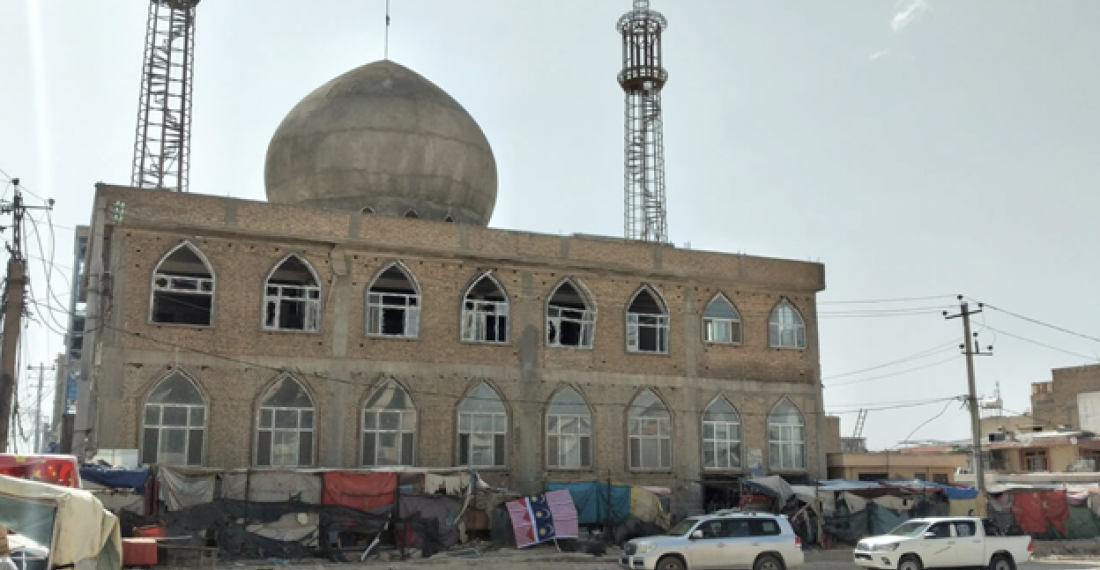The terrorist jihadist group "Islamic State" (IS) claimed responsibility for a cluster of deadly attacks across Afghanistan on 21 April. The explosions were aimed at mosques as well as Taliban affiliated vehicles. At least 31 were killed and 87 were wounded. Another blast was reported on 22 April with 33 reported dead. No group is yet to claim responsibility for the latest attack.
The first attack by the IS was directed at a Shia Muslim mosque in the northern city of Mazar-i-Sharif. According to the Sunni IS, the blast was caused by a remotely detonated booby-trapped bag. At the time of the explosion, the mosque was filled with worshippers of the minority Hazara community. At least 11 people were killed. An anonymous eyewitness who was shopping near the place of worship said, “The glass of the shops was broken and it was very crowded and everyone started to run.” A Balkh province police spokesperson told the AFP that the “mastermind” behind the mosque attack, Abdul Hamid Sangaryar, was arrested Friday 22 April.
Another attack was carried out in the northeastern city of Kunduz. A vehicle near a police station was blown up, leaving four dead and 18 wounded. The BBC received reports of the deaths of four Taliban members after the explosion of a Taliban-owned vehicle in the Eastern province of Nangarhar. A final attack of the day, claimed by the IS, took place in Kabul when a detonated mine left two children wounded. The spurt of attacks came only two days after two bombs at the Abdul Rahim Shahid high school killed at least six. On Friday, a deadly explosion at a mosque in Kunduz during Friday prayers was reported with 33 killed in the attack. The architect behind the Friday attack is still unknown.
A regional public health spokesman said, “blood and fear are everywhere,” as family members frantically looked for their relatives. The United Nation’s special rapporteur for Afghanistan stated on Twitter, “Today more explosions rocks Afghanistan [...] and again the Hazara community is a victim. Systematic targeted attacks on crowded schools and mosques calls for immediate investigation, accountability and end to human rights violations.”
The Islamic State (IS) claimed responsibility for a cluster of deadly attacks across Afghanistan on 21 April. The explosions were aimed at mosques as well as Taliban affiliated vehicles. At least 31 were killed and 87 were wounded. Another blast was reported on 22 April with 33 reported dead. No group is yet to claim responsibility for the latest attack.
The first attack by the IS was directed at a Shia Muslim mosque in the northern city of Mazar-i-Sharif. According to the Sunni IS, the blast was caused by a remotely detonated booby-trapped bag. At the time of the explosion, the mosque was filled with worshippers of the minority Hazara community. At least 11 people were killed. An anonymous eyewitness who was shopping near the place of worship said, “The glass of the shops was broken and it was very crowded and everyone started to run.” A Balkh province police spokesperson told the AFP that the “mastermind” behind the mosque attack, Abdul Hamid Sangaryar, was arrested Friday 22 April.
Another attack was carried out in the northeastern city of Kunduz. A vehicle near a police station was blown up, leaving four dead and 18 wounded. The BBC received reports of the deaths of four Taliban members after the explosion of a Taliban-owned vehicle in the Eastern province of Nangarhar. A final attack of the day, claimed by the IS, took place in Kabul when a detonated mine left two children wounded. The spurt of attacks came only two days after two bombs at the Abdul Rahim Shahid high school killed at least six. On Friday, a deadly explosion at a mosque in Kunduz during Friday prayers was reported with 33 killed in the attack. The architect behind the Friday attack is still unknown.
A regional public health spokesman said, “blood and fear are everywhere,” as family members frantically looked for their relatives. The United Nation’s special rapporteur for Afghanistan stated on Twitter, “Today more explosions rocks Afghanistan [...] and again the Hazara community is a victim. Systematic targeted attacks on crowded schools and mosques calls for immediate investigation, accountability and end to human rights violations.”
The IS say that the actions are part of a global campaign to “avenge” the death of its former leader and spokesman. While the Taliban government in Afghanistan say that they have defeated the extremist Jihadist group, the outburst of attacks highlights the continuing security risk that the group poses. Afghanistan has suffered several attacks over the past week as at least 47 were killed after Pakistan conducted airstrikes in Eastern Afghanistan.






